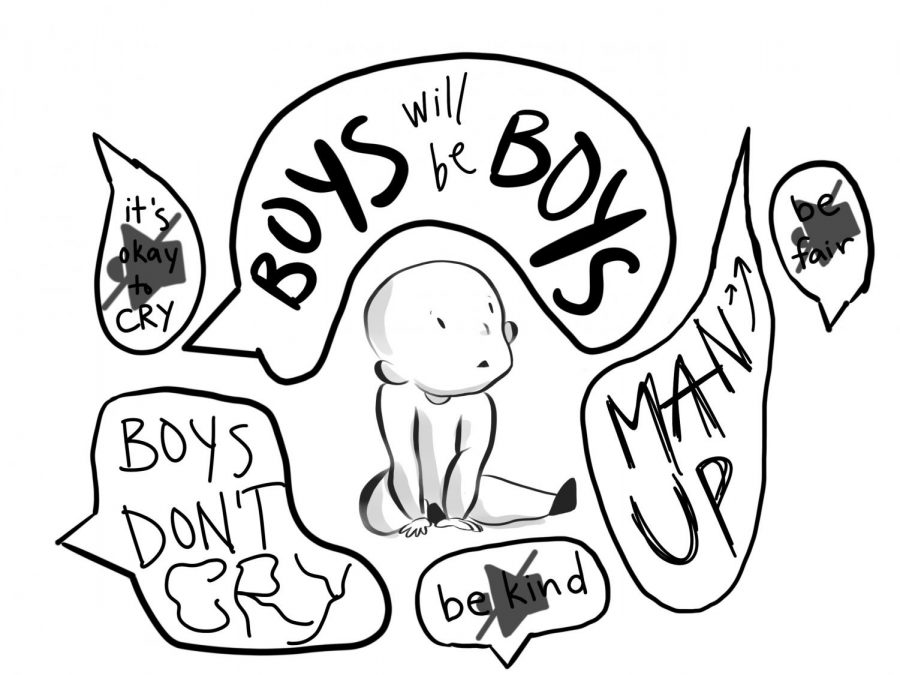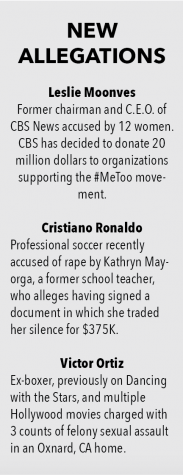Movement for better men takes hold
Haris Hosseini (12) was fourteen years old when his grandmother passed away. He wept at her funeral, lost in his grief. His mourning was interrupted when another attendee approached him and said, “Do you really want to think [your grandmother] wants to see her grown grandson cry?”
The comment left a considerable impression on Haris. “In the years following I was thinking about why is it such an anomaly for boys to express emotion?” Haris said.
17 years later, the incident lead Haris to write and present a speech, “The Man Problem”, that explored toxic masculinity.
“I sat down and just wrote about what to me, and so I wrote about toxic masculinity,” Haris said. “I think it is kind of naive to look at the events in the last couple of years, you know, and not think that there is a fundamental issue with a great subset of male behavior in this country.”
Since the #MeToo movement was started by Tarana Burke in 2006 and was reinvigorated by Alyssa Milano in 2017, thousands of female survivors of sexual assault from all walks of life have come forward to tell their stories. As of Jan. 22, 2018, 7.5 million tweets have been shared with the hashtag #MeToo. Since then, the hashtag has spurred action: powerful abusers and harassers have been removed from their jobs, and hundreds of survivors marched down Hollywood Boulevard last November.
More and more accounts of assault continue to be uncovered. On Sept. 27, another woman, Dr. Christine Blasey Ford, came forward about her experience with sexual abuse after the letter she wrote to senator Dianne Feinstein was leaked to the public. This time, it was in front of the U.S. Senate, and about a Supreme Court nominee.
Following her allegations, new light has been shed on Justice Brett Kavanaugh’s past. Though Kavanaugh has denied Ford’s allegations and was ultimately confirmed to the Supreme Court, comments about women written his high school yearbook reflect the nature of the male culture he participated in.
Another movement alongside the #MeToo activists aims to alleviate the global problem of sexual harassment by changing this culture.
This movement has multiple hashtags. #HowIWillChange, started on Oct. 17, 2017, by writer Benjamin Law, aims to have men assist the #MeToo movement by posting how they will change their actions to combat the issue of sexual assault.
The push to reform the culture of men is multifaceted, targeting the issues with upbringing of boys as well as the problems with the culture at companies grown men work at. Proponents of the movement range from advocates who dedicate their lives to combating sexual harassment to teachers.
When upper school English teacher Christopher Hurshman taught at an all-boys boarding school in Connecticut prior to teaching at Harker, he aimed to model proper behavior rather than preaching it to his students, as he concluded that it was a more effective method of teaching boys how to be good men.
According to Hurshman, the students’ perception of the messenger is also crucial to their absorption of the lesson.
“If they saw it from an adult that seemed only vulnerable but not necessarily very strong or very tough, then they could easily dismiss that model,” Hurshman said. “If they saw that there were people who they saw as independent and strong and self-sufficient who also presented themselves as experiencing powerful emotions and sometimes feeling very frustrated, the more it gave the students permission to do it too.”
Professional advocates, particularly those who specialize in workplace sexual harassment, focus on the broader causes and effects of a toxic male culture.
Before and after Brotopia, Emily Chang’s expose about the toxic male culture in the Silicon Valley, was published, there has been a spotlight on sexual harassment in the tech industry. Activists that aim to address the problem specifically in this industry also note a problem with the culture.
Rachel Renock, 27, is the CEO and creative director of startup Wethos, a company that connects nonprofit organizations with freelance professionals. She has been featured in The New York Times and on NBC for her activist efforts to combat sexual violence in the workplace.
According to Renock, the culture of the industry has shaped the standards of male behavior in tech.
“[Tech] companies go up so quickly and scale so quickly, so there’s not a lot of time to think about policies and company structure and diversity,” Renock said in an interview last spring.
Proponents of the movement acknowledge that is about reforming the male culture rather than simply denigrating men for their actions. Haris Hosseini, who wrote a speech about toxic masculinity and presented to the student body on Sept. 4, advocates the idea that this should be stated explicitly.
“One of the big things to make clear in the discussion is that this is not an attack on men, this is an attack on a certain, toxic brand of manhood, that unfortunately has become widespread,” Haris said. “To say that there’s an issue with how we’re raising boys is not to attack men, it’s to acknowledge a very clear truth that there’s a problem.”
A shorter version of this piece was originally published in the pages of The Winged Post on October 17, 2018.

Irina Malyugina (11) is the photo editor of Harker Aquila and the Winged Post. This is her third year on staff. She has a passion for visual storytelling...

Arya Maheshwari (12) is the co-editor-in-chief of the Winged Post. This is his fourth year on staff, and he's looking forward to developing his writing...

Nicole Tian (12) is the co-editor-in-chief of Harker Aquila. This is her fourth year on staff, and she previously served as the opinion editor, co-lifestyle...

Nina Gee (12) is the co-design editor for the Winged Post. This is her fourth year on the Harker Journalism staff. An aspiring filmmaker and avid storyteller,...


















![“[Building nerf blasters] became this outlet of creativity for me that hasn't been matched by anything else. The process [of] making a build complete to your desire is such a painstakingly difficult process, but I've had to learn from [the skills needed from] soldering to proper painting. There's so many different options for everything, if you think about it, it exists. The best part is [that] if it doesn't exist, you can build it yourself," Ishaan Parate said.](https://harkeraquila.com/wp-content/uploads/2022/08/DSC_8149-900x604.jpg)




![“When I came into high school, I was ready to be a follower. But DECA was a game changer for me. It helped me overcome my fear of public speaking, and it's played such a major role in who I've become today. To be able to successfully lead a chapter of 150 students, an officer team and be one of the upperclassmen I once really admired is something I'm [really] proud of,” Anvitha Tummala ('21) said.](https://harkeraquila.com/wp-content/uploads/2021/07/Screen-Shot-2021-07-25-at-9.50.05-AM-900x594.png)







![“I think getting up in the morning and having a sense of purpose [is exciting]. I think without a certain amount of drive, life is kind of obsolete and mundane, and I think having that every single day is what makes each day unique and kind of makes life exciting,” Neymika Jain (12) said.](https://harkeraquila.com/wp-content/uploads/2017/06/Screen-Shot-2017-06-03-at-4.54.16-PM.png)








![“My slogan is ‘slow feet, don’t eat, and I’m hungry.’ You need to run fast to get where you are–you aren't going to get those championships if you aren't fast,” Angel Cervantes (12) said. “I want to do well in school on my tests and in track and win championships for my team. I live by that, [and] I can do that anywhere: in the classroom or on the field.”](https://harkeraquila.com/wp-content/uploads/2018/06/DSC5146-900x601.jpg)
![“[Volleyball has] taught me how to fall correctly, and another thing it taught is that you don’t have to be the best at something to be good at it. If you just hit the ball in a smart way, then it still scores points and you’re good at it. You could be a background player and still make a much bigger impact on the team than you would think,” Anya Gert (’20) said.](https://harkeraquila.com/wp-content/uploads/2020/06/AnnaGert_JinTuan_HoHPhotoEdited-600x900.jpeg)

![“I'm not nearly there yet, but [my confidence has] definitely been getting better since I was pretty shy and timid coming into Harker my freshman year. I know that there's a lot of people that are really confident in what they do, and I really admire them. Everyone's so driven and that has really pushed me to kind of try to find my own place in high school and be more confident,” Alyssa Huang (’20) said.](https://harkeraquila.com/wp-content/uploads/2020/06/AlyssaHuang_EmilyChen_HoHPhoto-900x749.jpeg)




